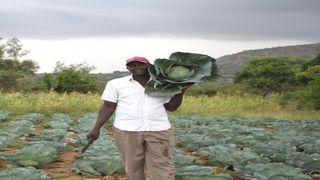
Daniel Mutua at his vegetable farm along River Enguli in Makueni County. He is a former sand miner who has turned to a conservationist.
| Pius Maundu | Nation Media GroupMakueni
Premium
Former sand miners in Makueni struggling to eke out a living
Six years after Makueni County outlawed unregulated sand mining, many rivers and streams in the region are slowly recovering, spawning multiple farming ventures along the waterways that were once battlefields between hirelings of sand merchants and conservationists.
But the former sand miners and loaders, known locally as makusa, continue to bear the brunt of the ban on the sand trade.
Wilfred Masaku, 45, dropped out of secondary school in Form Two and became a sand loader at River Muuoni. After seven years of hard work and long hours spent at drinking dens, he attempted in vain to quit the lucrative trade.
"When I tried to go back to Mbuthani Secondary School, administrators turned me away, saying that I was old. I gave up," he told the Nation recently.
He is among hundreds of former makusa who regret wasting their youthful days in the trade and drug abuse, which is intertwined with sand mining. They cannot pursue their dream careers as they lack the necessary training.

Six years after Makueni County outlawed unregulated sand mining, former sand miners and loaders continue to bear the brunt of the ban on the sand trade.
The authorities do not keep official figures of learners who dropped out of school and college to scoop sand in local streams and rivers. But Rev Peter Musyoka, a pastor in Kiu and programmes manager at Compassion, a local non-governmental organisation whose mission includes rehabilitating children, estimates that sand harvesting has disrupted the studies of at least 100 pupils in the Kiu area alone. Other regions were also affected.
School dropouts
"Many local schools reported between 10 and 20 cases of dropouts between 1990 and 2016 when the unregulated sand trade was a major economic activity in the region,” he said.
“The school dropouts ended up providing cheap labour at the sand mines. The number of school dropouts in this region has since reduced significantly. In fact, no single case has been reported to us since 2017. We are glad the rivers are healing rapidly.
“However, we are concerned because former sand miners are yet to lead normal lifestyles. They carry around scars of wounds they sustained in their youth."
Another former makusa is Mwololo Katonyi, who grows assorted vegetables in Ngondini village using water from the River Ikolya, where he used to harvest sand. The 30-year-old trained carpenter is among a paltry three to five percent of former sand miners who have found meaningful alternative livelihoods, according to Franklin Nzuki, who supervised a team of makusa.
The sand miners turned conservationists include Daniel Musau, who grows vegetables on a small plot along the River Enguli. “We are confident sand harvesting is a thing of the past along this river because we have seen the value of sand. However, the riparian community needs to be empowered to practise meaningful agriculture because water is no longer an issue,” he said.

Daniel Mutua grows vegetables on a small plot along the River Enguli.
Successful farmer
Mr Nzuki is lucky. Although he dropped out of college in 2007 and joined dozens of sand loaders at the River Muooni, he has become a successful farmer after the county government stopped the trade.
He was among dozens of youth who were trained on agribusiness in a programme sponsored by the county government and KCB Bank. He feels that he has turned around his life.
“There is a lot of peace of mind in farming compared to the sand trade. A farmer eats from his sweat and does not have to dodge the authorities,” he said, recalling how, after a year of shovelling sand onto trucks and fighting authorities, he rose through the ranks and became a sand broker.
"A broker is tasked with leading lorries to the sites, scouting for loaders and bribing authorities," he said.
When Governor Kivutha Kibwana’s administration enacted the Makueni Sand Conservation and Utilization Act in 2015, sand merchants enlisted more makusa to fight county government askaris and officials who attempted to enforce the sand law.
Geoffrey Kasyoki, a local police officer who was openly against sand harvesting, was among at least 10 lives that were lost in the conflicts. At least 20 vehicles were destroyed in the confrontations that involved county askaris, a local vigilante group and dozens of makusa armed with rubber catapults, spades, machetes, bows and arrows.
To resolve the conflicts, the county government enlisted some of the youth who were involved in the lucrative sand trade. They are tasked with spying on the activities of sand merchants in the region, championing sand conservation and foiling illegal sand mining.
Halinishi Yusuf, the managing director at the Makueni Sand Conservation and Utilisation Authority, the agency that regulates sand harvesting and restores rivers, acknowledges that many more young people have relocated to neighbouring counties where sand harvesting is rife, portending future trouble for the recovering rivers running across Makueni County.





